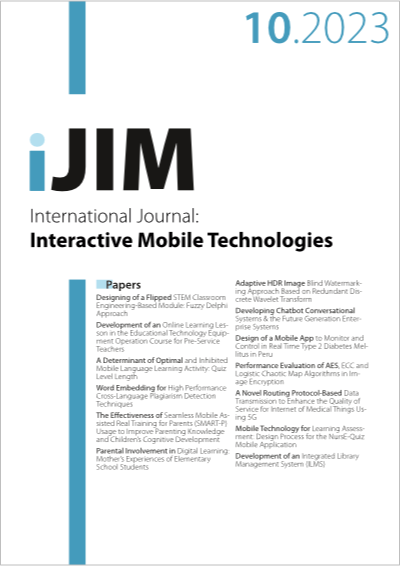The Effectiveness of Seamless Mobile Assisted Real Training for Parents (SMART-P) Usage to Improve Parenting Knowledge and Children’s Cognitive Development
DOI:
https://doi.org/10.3991/ijim.v17i10.37883Keywords:
SMART-P, Parenting Knowledge, Cognitive DevelopmentAbstract
This study aims to develop and identify the effect of SMART-P training on parenting knowledge and children's cognitive development. This research is included as Mix Method research with an ADDIE development model and experimental quantitative research approach. The research method used is explanatory research with a non-equivalent control group design research involving the control and experimental classes. This research is carried out for three weeks, with the stages covering: analysis, design, development, research instrument development, implementation, and evaluation. The population in this study are 714 parents with children aged four years from posyandu/KB in five sub-districts of Malang City, with a research sample of 150 parents with children aged four years and six experts. Data collection techniques in this study used questionnaires and observation checklists. Data analysis in this study used descriptive percentage analysis and SPSS analysis. The results show that 1) SMART-P application is declared valid and acceptable to be implemented as a training medium, 2) a significant effect of parenting knowledge in parents before and after being given parenting training using SMART-P is identified, 3) a significant effect on the development cognitive development of children before and after parents re given care using SMART-P application is identified, 4) a significant difference in the effect of parenting knowledge on parents between the control group and the experimental group is shown, and 5) a significant difference in the effect on children's cognitive development between the control group and the experimental group is slightly identified. Therefore, parenting research using SMART-P needs to be carried out continuously so that parenting knowledge and children's cognitive development can be maximized
Downloads
Published
How to Cite
Issue
Section
License
Copyright (c) 2023 Evania Yafie, Zakiah Mohamad Ashari, Norazrena Abu Samah , Riyana Widiyawati, Diana Setyaningsih , Yudha Alfian Haqqi

This work is licensed under a Creative Commons Attribution 4.0 International License.



